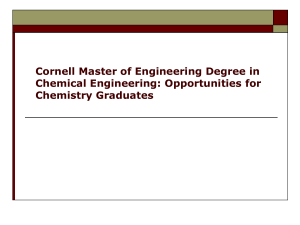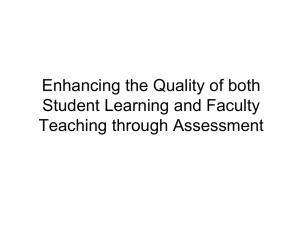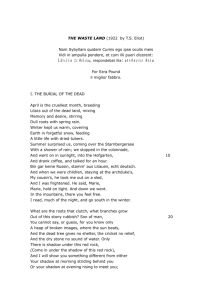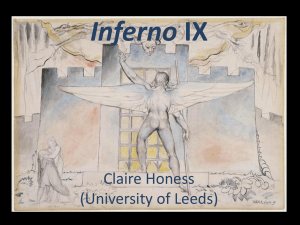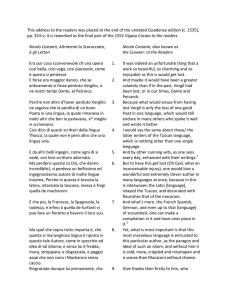Master of Applied Science - School of Graduate Studies
advertisement
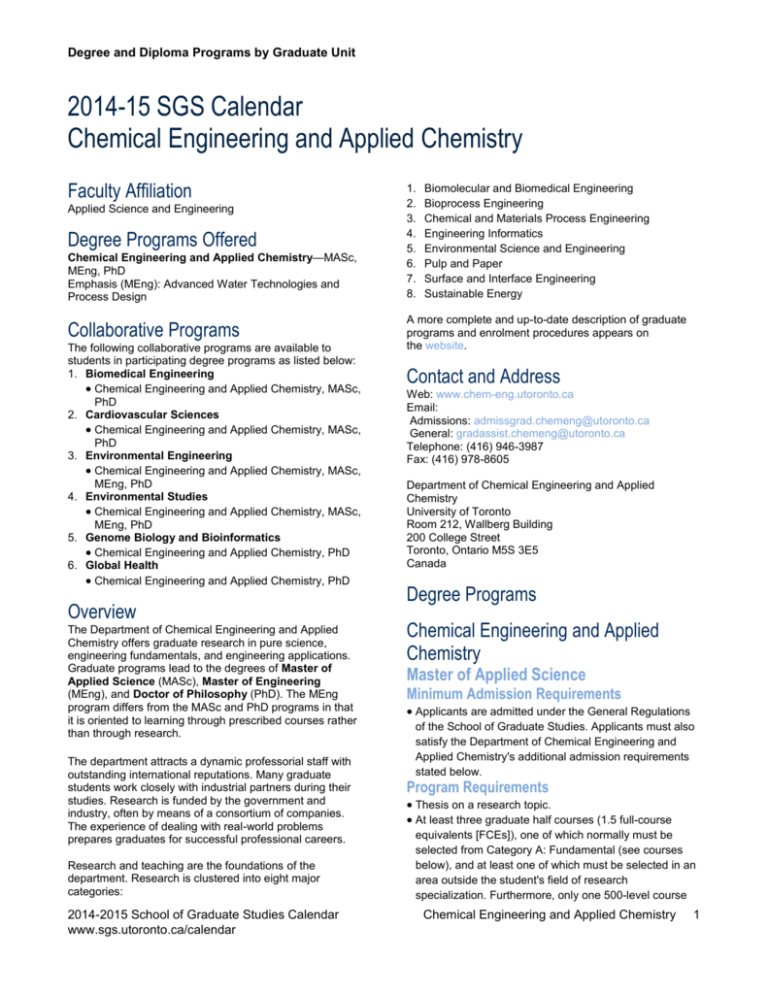
Degree and Diploma Programs by Graduate Unit 2014-15 SGS Calendar Chemical Engineering and Applied Chemistry Faculty Affiliation Applied Science and Engineering Degree Programs Offered Chemical Engineering and Applied Chemistry—MASc, MEng, PhD Emphasis (MEng): Advanced Water Technologies and Process Design Collaborative Programs The following collaborative programs are available to students in participating degree programs as listed below: 1. Biomedical Engineering Chemical Engineering and Applied Chemistry, MASc, PhD 2. Cardiovascular Sciences Chemical Engineering and Applied Chemistry, MASc, PhD 3. Environmental Engineering Chemical Engineering and Applied Chemistry, MASc, MEng, PhD 4. Environmental Studies Chemical Engineering and Applied Chemistry, MASc, MEng, PhD 5. Genome Biology and Bioinformatics Chemical Engineering and Applied Chemistry, PhD 6. Global Health Chemical Engineering and Applied Chemistry, PhD Overview The Department of Chemical Engineering and Applied Chemistry offers graduate research in pure science, engineering fundamentals, and engineering applications. Graduate programs lead to the degrees of Master of Applied Science (MASc), Master of Engineering (MEng), and Doctor of Philosophy (PhD). The MEng program differs from the MASc and PhD programs in that it is oriented to learning through prescribed courses rather than through research. The department attracts a dynamic professorial staff with outstanding international reputations. Many graduate students work closely with industrial partners during their studies. Research is funded by the government and industry, often by means of a consortium of companies. The experience of dealing with real-world problems prepares graduates for successful professional careers. Research and teaching are the foundations of the department. Research is clustered into eight major categories: 2014-2015 School of Graduate Studies Calendar www.sgs.utoronto.ca/calendar 1. 2. 3. 4. 5. 6. 7. 8. Biomolecular and Biomedical Engineering Bioprocess Engineering Chemical and Materials Process Engineering Engineering Informatics Environmental Science and Engineering Pulp and Paper Surface and Interface Engineering Sustainable Energy A more complete and up-to-date description of graduate programs and enrolment procedures appears on the website. Contact and Address Web: www.chem-eng.utoronto.ca Email: Admissions: admissgrad.chemeng@utoronto.ca General: gradassist.chemeng@utoronto.ca Telephone: (416) 946-3987 Fax: (416) 978-8605 Department of Chemical Engineering and Applied Chemistry University of Toronto Room 212, Wallberg Building 200 College Street Toronto, Ontario M5S 3E5 Canada Degree Programs Chemical Engineering and Applied Chemistry Master of Applied Science Minimum Admission Requirements Applicants are admitted under the General Regulations of the School of Graduate Studies. Applicants must also satisfy the Department of Chemical Engineering and Applied Chemistry's additional admission requirements stated below. Program Requirements Thesis on a research topic. At least three graduate half courses (1.5 full-course equivalents [FCEs]), one of which normally must be selected from Category A: Fundamental (see courses below), and at least one of which must be selected in an area outside the student's field of research specialization. Furthermore, only one 500-level course Chemical Engineering and Applied Chemistry 1 Degree and Diploma Programs by Graduate Unit may be taken for credit towards the degree program. Students are also required to complete CHE 2222H and JDE 1000H as well as attend four sessions of the CHE 300xH seminar series. Students are required to take a graduate student seminar, presenting two times during their program, once in the first year and once in the second year of study. Each student should discuss possible research projects with several members of the department before selecting a research area and a supervisor. The program requires a minimum full-time residence of two sessions (eight months). Program Length 6 sessions full-time (typical registration sequence: F/W/S/F/W/S) Time Limit 3 years full-time Master of Engineering Minimum Admission Requirements Applicants are admitted under the General Regulations of the School of Graduate Studies. Applicants must also satisfy the Department of Chemical Engineering and Applied Chemistry's additional admission requirements stated below. Program Requirements The program normally requires completion of a total of 5.0 full-course equivalents (FCEs) or 3.5 FCEs plus a 1.5-FCE project supervised by a faculty member. At the discretion of the supervisor, a second reviewer and/or oral defence may be requested for students who plan to enter the doctoral program. The MEng program can be completed on a full-time, extended full-time, or part-time basis. o Full-time option: students normally complete the requirements in three sessions (one year). o Extended full-time option: students are expected to complete the requirements in six sessions (two years) and are limited to six half courses per year and three half courses per session. o Part-time option: students are limited to four half courses per year and two half courses per session. Students normally complete the requirements in nine sessions (three years). This program is intended primarily for engineers in full-time professional practice. Students in the MEng program have the option of completing an emphasis in Advanced Water Technologies and Process Design as part of their degree program. Please see details at the end of this entry. 2014-2015 School of Graduate Studies Calendar www.sgs.utoronto.ca/calendar Program Length 3 sessions full-time (typical registration sequence: F/W/S); 6 sessions extended full-time (typical registration sequence: F/W/S/F/W/S)**; 9 sessions part-time Time Limit 3 years full-time and extended full-time; 6 years part-time ** Students may begin the program at different times. Doctor of Philosophy Minimum Admission Requirements Applicants are admitted under the General Regulations of the School of Graduate Studies. Applicants must also satisfy the Department of Chemical Engineering and Applied Chemistry's additional admission requirements stated below. Applicants may enter the program via one of three routes: 1. following completion of an MASc program with a minimum B+ average and exceptional all-around scientific and intellectual ability as evidenced from theoretical or experimental research, academic standing, initiative, and publication record 2. transferring from the University of Toronto MASc program after completing one year; such students must successfully complete a bypass examination 3. direct entry after completing a bachelor's degree may be considered in exceptional cases International applicants with a master's degree from outside Canada or the United States in their country of residence may be asked to register in the MASc program and follow entry route 2. Flexible-Time PhD Option Applicants to the flexible-time PhD option are accepted under the same admission requirements as applicants to the full-time PhD option. However, in addition, applicants to the flexible-time PhD option must demonstrate that they are actively engaged in professional activities related to their proposed program of study. Program Requirements Thesis on a research topic. Students with a completed MASc degree: at least 2.0 full-course equivalents (FCEs). Transfer students: 3.0 FCEs for students without a master's degree 2.0 FCEs for students with a completed master's degree. Transfer students do not have to take a separate PhD qualifying examination. Direct-entry students: at least 3.0 FCEs. Students in the flexible-time PhD program will be subject to the same requirements as students in the full-time program. Courses must be selected from the calendar and approved by the student's supervisor and the Graduate Coordinator. At least one of these courses must be Chemical Engineering and Applied Chemistry 2 Degree and Diploma Programs by Graduate Unit taken in a minor area of study. It is recommended that one of these courses should be selected from Category A: fundamental courses. Normally, PhD students are not allowed to take a 500-level course for credit towards the degree program. Students are also required to complete eight sessions of the seminar: attending CHE 300xH series and, if not already completed, CHE 2222H and JDE 1000H. Students are required to take a graduate student seminar: attending course two times in their program, once in the first year and once in the third year of study. Within 9 to 12 months of starting the PhD program, students must pass a qualifying examination—flexibletime PhD students must complete this requirement within 16 months of the start of their program. Students normally remain in residence (full-time, on campus) until the departmental recommendation for the Doctoral Final Oral Examination is made, unless special permission to do so has otherwise been granted by the departmental Graduate Studies Committee. Program Length 4 years full-time; 5 years direct-entry; 5 years transferfrom-master's, 6 years flexible-time Time Limit 6 years full-time; 7 years direct-entry; 7 years transferfrom-master's during the week immediately preceding the commencement of graduate courses in the fall. In each subsequent year of registration, students must take the WHMIS refresher workshop. Students registered in a graduate degree program involving research are required to participate in the non-credit seminar course JDE 1000H Ethics in Research during their first or second session of registration. Category A: Fundamental Courses CHE 1100H Fundamentals of Chemical Engineering CHE 1107H Applied Mathematics CHE 1141H Advanced Chemical Reaction Engineering CHE 1142H Applied Chemical Thermodynamics CHE 1143H Transport Phenomena JTC 1134H Applied Surface and Interface Science JTC 1135H Applied Surface Chemistry CHE 1310H Chemical Properties of Polymers Category B: Specialized Courses CHE 1053H Electrochemistry CHE 1118H Industrial Catalysis CHE 1123H Liquid Biofuels CHE 1125H Modelling and Optimization of Chemical and Biomedical Networks CHE 1134H Advances in Bioengineering CHE 1146H Applied Transport Phenomena in Energy Systems CHE 1147H Data Mining in Engineering CHE 1150H Industrial Water Technology CHE 1213H Corrosion CHE 1314H The Structure and Properties of Fibrous Materials An updated course list and schedule is available on the departmental website at the beginning of each session listing the time and room location for each course. Not all courses are given every year. JTC 1331H Biomaterials Science JCB 1349H Molecular Assemblies: Structure/Function/Properties All students wishing to undertake research and teaching in the Department of Chemical Engineering and Applied Chemistry must successfully complete an intensive occupational health and safety training workshop, CHE 2222H Safety Workshop, which normally takes place CHE 1400H Environmental Nuclear Science CHE 1430H Hydrometallurgy, Theory and Practice (MEng only) Emphasis: Advanced Water Technologies and Process Design Master of Engineering (MEng) students must successfully complete: 2.0 full-course equivalents (FCEs) (four half courses), which are counted towards the total 5.0 FCEs required for the MEng program Four courses selected from: CIV 549H, CIV 550H, CIV 1303H, CIV 1319H, CIV 1308H, CIV 1309H, CIV 1311H, CHM 1410H, CHE 565H, CHE 1180H, CHE 1213H, and CHE 1430H. Upon successful completion of the emphasis requirements and the successful completion of the MEng degree requirements, the student will receive a Letter of Completion. Course List 2014-2015 School of Graduate Studies Calendar www.sgs.utoronto.ca/calendar Chemical Engineering and Applied Chemistry 3 Degree and Diploma Programs by Graduate Unit CHE 1431H Environmental Auditing (MEng only) APS 1501H Leadership and Leading in Groups and Organizations CHE 1432H Technical Aspects of Environmental Regulations (MEng only) CHE 507H Process Modelling and Simulation CHE 1433H Air Dispersion Modelling CHE 553H Electrochemistry CHE 1434H Six Sigma for Chemical Processes CHE 561H Risk Based Safety Management CHE 1533H Nuclear Chemical Engineering CHE 564H Pulp and Paper Processes CHE 1541H Two-Phase Flow and Heat Transfer CHE 565H Aqueous Process Engineering CHE 2504H Environmental Pollution Prevention CHE 568H Nuclear Engineering JCC 1313H Environmental Microbiology CHE 575H Mechanical Properties of Bio-Composites and Biomaterials JCI 1321H Wood Engineering JNC 2503H Environmental Pathways Engineering Management Courses CHE 2011H Graduate Student Seminars (Credit/No Credit) APS 530H Appropriate Technology and Design for Global Development CHE 300xH APS 1001H Project Management Seminars in Chemical Engineering and Applied Chemistry (Credit/No Credit) APS 1002H Financial Engineering JCR 1000Y An Interdisciplinary Approach to Addressing Global Challenges APS 1003H Professional Education and Instruction APS 1004H Human Resource Management: An Engineering Perspective APS 1005H Operations Research for Engineering Management APS 1010H Cognitive and Psychological Foundations of Effective Leadership APS 1011H Concepts and Application of Authentic Leadership APS 1018H History and Philosophy of Engineering APS 1020H International Business for Engineers APS 1026H Positive Psychology for Engineers APS 1088H Entrepreneurship and Business for Engineers APS 1201H Topics in Engineering and Public Policy 500-level (undergraduate/graduate) Courses 2014-2015 School of Graduate Studies Calendar www.sgs.utoronto.ca/calendar Seminar Courses In addition to the above courses, students may elect to take courses in other engineering or science departments where such courses are deemed relevant to the area of study. These courses require prior approval from the Graduate Coordinator. Chemical Engineering and Applied Chemistry 4

